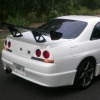Good Tow Cars?
Announcements
-
Similar Content
-
Latest Posts
-
By joshuaho96 · Posted
I don't even know that you want an M2 Competition as a track car. My rule for a track car is only risk as much as you're willing to completely total out. Clean stock C5 Z06 Corvettes out here are cheap. Buying someone else's already ruined track car is even cheaper. Maybe I'm just not that good a driver but even a Fiesta ST on the Nordschleife felt like as much car as I could realistically handle. -
I've already gone over the cam. A new one is going in. An old one is coming out! The new one is smaller, with less overlap. It has way more lift, but it will be more mild mannered (hopefully, probably very minorly) I'm also measuring for two more mufflers, with the goal of having four mufflers in my car. But that probably will be done by an exhaust shop in a drive in, measure, buy parts, install parts later kind of deal.
-
Mine is not even a GTR and I've been resisting the urge to make it a power monster for the last 25 years. And as a consequence, I have driven it to work nearly every day across that span of time.
-
By Dose Pipe Sutututu · Posted
Since the motor is out, I suggest pop in a nice dirty LS chop cam. MOAR of this please: -
By Dose Pipe Sutututu · Posted
This.. no one is going into it wanting to "build" a fast track car, because let's be honest you can buy a i30N or Type-R lawn mower and both will destroy a R32 GT-R (even with mild mods) around a circuit. Greg is on the Gregging money here. If you love your R32 GT-R, just leave it stock and enjoy it and If you want a fast car to play with and hit the track with, just put aside $80K for a M2 Competition and keep the R32 GT-R as a weekend cruiser. Same outcome (you have a R32 GT-R and you have a fast track car) really.
-







Recommended Posts
Create an account or sign in to comment
You need to be a member in order to leave a comment
Create an account
Sign up for a new account in our community. It's easy!
Register a new accountSign in
Already have an account? Sign in here.
Sign In Now